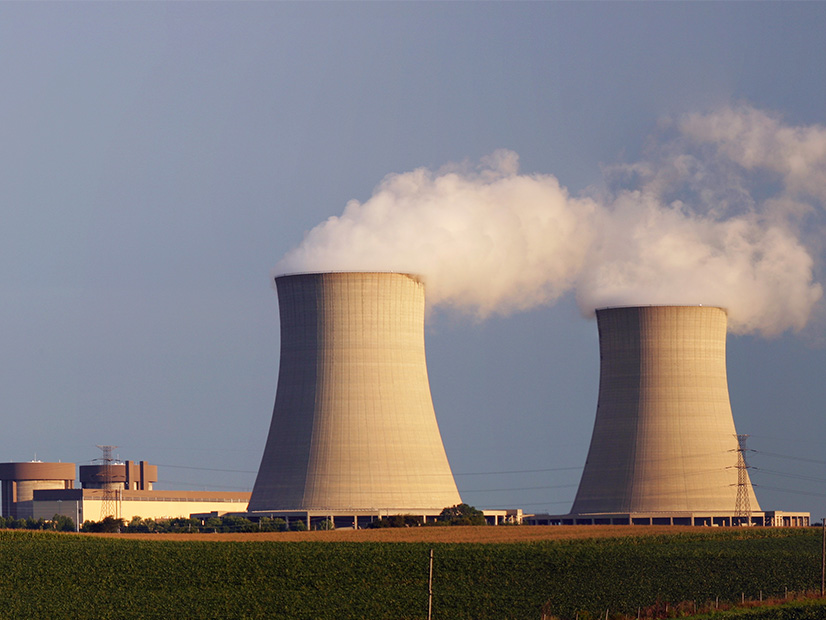The fate of Exelon’s Byron and Dresden nuclear plants depends on whether the Illinois legislature can pass a comprehensive energy package with substantial support for the two plants, CEO Christopher Crane said during the company’s first-quarter earnings call Wednesday.
And lawmakers only have until the end of their official session on May 31 to do it, he said.
“Legislative leaders are meeting to craft a package; however, the details really matter,” Crane said. “Current market prices do not allow us to continue to meet our payroll, pay our property taxes, and cover other significant costs and risks of operating these assets without adequate policy. We will begin retiring uneconomic plants this fall.”
Nuclear policy, both state and federal, and the $880 million first-quarter loss Exelon took in the Texas winter power outages in February were top of mind for Crane during the earnings call. The outages at the utility’s three natural gas plants in Texas were the main factor in the company’s first-quarter GAAP net loss of 30 cents/share, down from 60 cents in the first quarter 2020. Exelon’s adjusted operating loss of 6 cents/share was also down from 87 cents last year, he said.
“The event was unprecedented,” Crane said. “We continue to investigate the multiple, complex factors that led to our plant outages, and we’re working with regulators and other stakeholders to ensure this does not happen again.”
He also gave a quick update on the company’s planned separation of its regulated utilities and merchant generation business, announced during its February earnings call. At that time, Exelon said the restructuring would create the nation’s “largest fully regulated transmission and distribution utility,” with six utilities in five states and D.C., and the largest producer of carbon-free power — thanks mostly to its 18.7-GW nuclear fleet. The utility also owns 12 GW of hydropower, solar, wind, gas and oil generation. (See Exelon to Split Tx, Generation Businesses.)
Applications for regulatory approval of the split have been filed with FERC, the Nuclear Regulatory Commission and the New York Public Service Commission, Crane said. Decisions from all three are expected by the end of the year, with the separation finalized in the first quarter of 2022.
Highly Uncertain and Too Late
Illinois is one of five states — along with Connecticut, New Jersey, New York and Ohio — that provides some form of support to keep nuclear plants open. Zero-emission credits (ZECs) are the primary form of support, ranging in value from $10 to $17.50/MWh, according to the U.S. Energy Information Administration.
Passed in 2016, Illinois’ Future Energy Jobs Act provided ZECs totaling $235 million per year for two Exelon plants, Clinton and Quad Cities. Suits to overturn ZEC programs in New York and Illinois were defeated in federal court in 2018. (See Appeals Court Upholds NY Nuclear Subsidies and 7th Circuit Upholds Ill. ZEC Program.)
During the earnings call, Crane cited growing recognition at the state and federal levels that the country’s nuclear fleet will be critical for meeting ambitious clean energy goals, such as President Biden’s 2035 target for decarbonizing the U.S. power system. Biden’s American Jobs Plan includes a clean energy standard, which would leverage existing nuclear plants as carbon-free power.
However, getting the plan through “is highly uncertain, and in any case, it will be too late to reverse the retirement decisions for Byron and Dresden,” the CEO said.
According to Exelon’s August 2020 announcement of the closures, the two plants together provide 30% of Illinois’ carbon-free power, employ 1,500 full-time workers and pay $63 million per year in taxes.
Seeking a transition to 100% clean power by 2050, Gov. J.B. Pritzker’s recently introduced the Consumers and Climate First Act would provide $19 million per year ($1/MWh) in subsidies for Byron and $52 million per year ($3.50/MWh) for Dresden through 2025. Those figures are based on recommendations from an independent financial analysis performed by Synapse Energy Economics.
“Byron and Dresden do face real risk of becoming uneconomic in the near term,” the study said. “This has implications for Illinois’ policy goals because the plants generate carbon-free electricity that is currently undervalued or even ignored within current wholesale electricity markets.”
But Crane said the modest and limited subsidies in the governor’s bill would not be enough to keep the plants open and pointed to the recent decision by the New Jersey Board of Public Utilities to provide ZECs of $10/MWh to keep PSEG’s Salem and Hope Creek nuclear plants open.
“The commission in New Jersey emphasized that maintaining the existing nuclear plants was critical to achieving the state’s emission goals and significantly less costly than replacing nuclear with other zero-carbon generation,” he said. “This is true in Illinois.
“We’ll continue to be optimistic that we can work with stakeholders and a legislative body and the administration,” Crane said. “But short of getting something done, we’ll have to start to proceed.”
Offsetting Texas Losses
Exelon is now estimating its “full-year loss from the [Texas] weather event to be approximately $900 million to $1.1 billion pre-tax, or $670 million to $820 million after tax,” according to CFO Joseph Nigro.
However, Nigro said, the company expects to offset a major portion of the losses through a “combination of enhanced revenue opportunities, deferral of selected nonessential maintenance and one-time cost savings,” and it still expects to hit its adjusted operating earnings of $2.60 to $3/share.
The company also announced $6.6 billion in capital expense spending for 2021. Building out electric vehicle infrastructure is a particular focus for the company’s utilities, Nigro said, with many offering rebates for installing residential charging stations and special time-of-use rates for off-peak charging. The company has also committed to electrifying 30% of its light- and heavy-duty vehicles by 2025 and 50% by 2030, he said.




